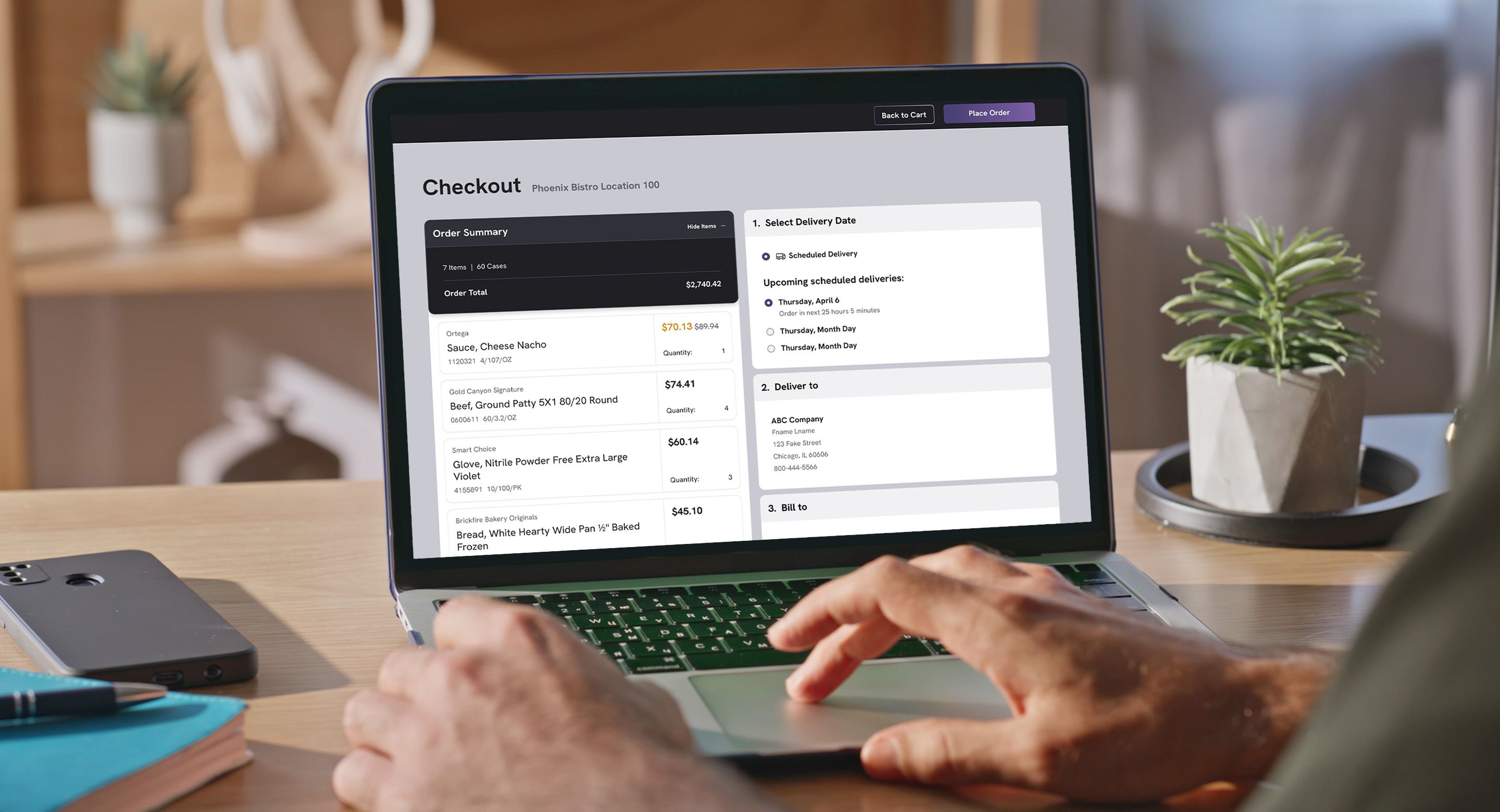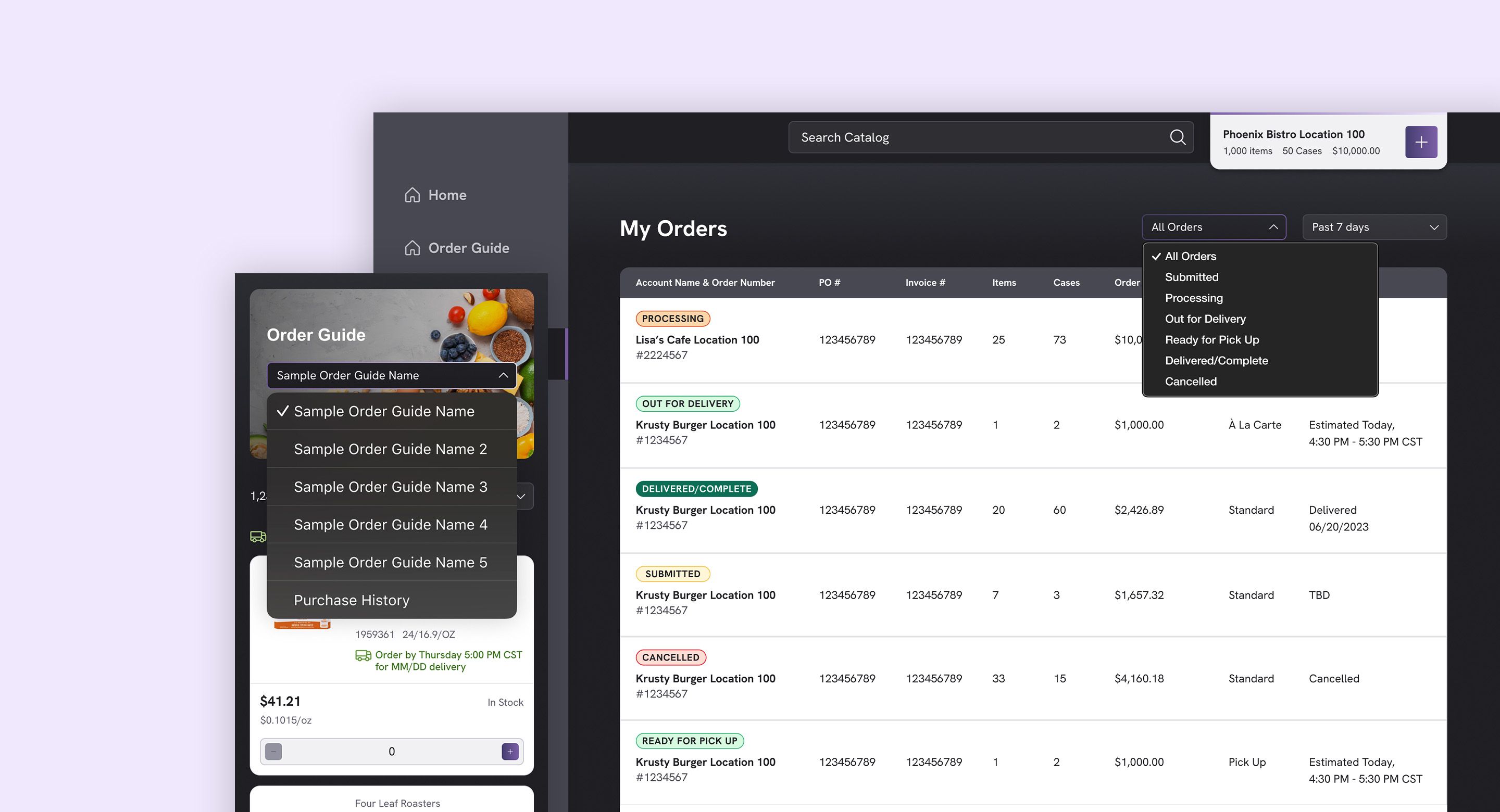Improving CX with Composable Commerce
Leveraging Orium's Composable Accelerator to improve CX and drive B2B growth with a modern technical architecture.

One of North America's leading B2B foodservice distributors wanted to refresh its digital and operational foundations to reflect the same reliability and scale that defined its heritage as a delivery partner to restaurants and businesses nationwide. They needed to move to a modern buying experience that would create ease for their customers and growth opportunities for their team. They brought in Orium to help redefine their customer experience and scale their commerce capabilities with a focus on digital offerings.





The Challenge
Enterprise B2B food distribution is a complex business, and the client's existing digital experience was struggling to meet the evolving needs of its customers and sales teams. Fragmented login and ordering processes were creating inefficiencies, increasing reliance on District Sales Representatives (DSRs) for routine transactions. Limited product discovery made navigating the company's vast SKU catalog challenging, while scalability constraints in the legacy system slowed innovation and growth. As a result, DSRs spent valuable time managing orders instead of focusing on customer relationships, and marketing teams faced limitations in updating content, relying on IT teams for any changes.
The client recognized an opportunity to enhance its digital experience to better support customers and sales teams. To address the challenges, they embarked on a multi-phase transformation, prioritizing a seamless customer experience and empowering their sales team with a scalable, modern solution.

The Strategy
To minimize risk and ensure a smooth transition, Orium and the client decided to take a phased approach to implementation that would leverage proofs of concept and iterative rollouts. This would allow the team to adjust in real-time based on feedback, ensuring they were delivering value to customers at every stage.
Phase one would be a Beta release—to be launched after just 3 months—which would introduce a streamlined digital ordering experience for a controlled subset of customers, allowing the client to test and validate key improvements and refine the platform's performance before full deployment.
Following the Beta, the client would expand adoption to a larger percentage of its customer base, progressively expanding adoption while enhancing functionality. As adoption increased, the team would focus on optimizing the platform's scalability, ensuring seamless collaboration between customers and DSRs while improving operational workflows.

The Solution
01
PHASE ONE - BETA RELEASE
The transformation began with a targeted Beta release, introducing the new platform to a select subset of customers. This allowed the client to refine the experience before scaling, focusing on:
- A fully customized UX/UI aligned with the client's operational needs and customer expectations.
- A foundational ordering flow that streamlined the customer experience, enabling seamless browsing, cart management, delivery selection, and order placement.
- A controlled rollout approach that ensured platform stability and validated the core experience before wider adoption.
The Beta release was a critical milestone, as it set the foundation for the client's transition to composable commerce. The implementation of commercetools Core and Frontend provided a flexible, API-first commerce engine that integrated seamlessly with their internal APIs, ensuring high performance and stability. Algolia was introduced as a powerful search engine, allowing them to implement account-based visibility rules, ensuring customers only saw relevant products based on their account permissions. A new unified login system simplified authentication, reducing friction in the user journey. To facilitate adoption and ease onboarding, Orium implemented Appcues, enabling the client to create guided tutorials for customers and internal teams to navigate the new system efficiently.
The Beta launched on time and under budget, demonstrating the efficiency of a composable approach and allowing the team to begin gathering customer feedback immediately.
02
PHASE TWO - ENHANCEMENTS & LARGE-SCALE ROLLOUT
Following the Beta, the client expanded adoption to a larger cohort of customers, introducing bi-weekly feature releases informed by customer feedback. Key improvements included:
- Enhanced Algolia search for better product discovery, with visibility rules tailored to customer accounts.
- GA4 tracking to provide real-time insights into customer behavior and optimize the experience.
- Expanded order modification and delivery options, offering greater flexibility for customers and improved fulfillment workflows.
- Order management tools, streamlining reordering for customers and District Sales Representatives (DSRs).
- DSR-assisted ordering capabilities, allowing sales reps to manage the process on behalf of customers when needed.
Ongoing collection of feedback and continuous improvement cycles meant that even as a host of new features were rolled out, the team was able to remain focused on customer experience and ensuring the new digital solutions met the core needs of both clients and reps. The steady rollout of new capabilities also gave the team momentum and supported buy-in for the third phase of work.
03
PHASE THREE - FULL ADOPTION & OPTIMIZATION
The third phase focused on scalability, collaboration between customers and sales teams, and continuous improvement. Key outcomes included:
- Load testing and a mock launch to ensure system readiness for mass adoption.
- A full platform rollout to the remaining eligible customers, including to the largest markets.
- Increased customer satisfaction and positive sentiment by 88%, demonstrating the success of the transition.
- Adjustment to release schedule to accelerate response times to customer-reported pain points as needed.
- Optimized sprint structures, reducing regression issues per sprint by 75% and improving platform stability.
The final phase ensured the platform was fully scalable, optimized for performance, and prepared for future growth. By January 2025, all eligible customers had successfully migrated to the new platform, achieving the client’s strategic business goals and empowering them to start work on new, value-add initiatives including A/B testing and segment-specific marketing. With a future-proof foundation in place, their sales teams can now focus on high-value service and business expansion, rather than transactional ordering tasks.

Outcomes & Next Steps
The transition to a composable commerce platform delivered measurable success. Customer sentiment improved dramatically, with 90% positive feedback from users. The shift to bi-weekly releases enabled faster response times to user-reported issues, refining search, navigation, and order management. Regression issues were reduced by 75%, improving the stability of feature releases. DSRs were able to shift their focus from manual order entry to high-value customer engagement and strategic sales growth. And the modular architecture of the platform ensures that the enterprise B2B food distributor can continue evolving its commerce capabilities without requiring major replatforming efforts.
Looking ahead, the client plans to expand AI-powered personalization, leveraging search recommendations and engagement data to refine customer interactions. The composable platform provides a flexible foundation that will allow them to scale and adapt to changing market demands, ensuring continued success in the competitive B2B foodservice landscape. By modernizing the client's digital experience, Orium not only improved operational efficiency but also positioned them for sustained growth and innovation in the years to come.


